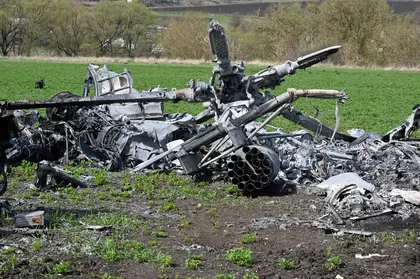Russia has now lost 100 helicopters since its full-scale invasion of Ukraine, including 10 over the course of Kyiv’s summer offensive, according to data collected by an independent intelligence and monitoring organization.
In its most recent website update, Oryx reports that the Russian military has now had 100 helicopters neutralized since February 2022 including 87 destroyed, 12 damaged and one captured by Ukrainian forces.
Ten Russian helicopters have been downed since the beginning of June when Ukraine ramped up counteroffensive activity on several sections of the 1,000-kilometer-long front.
Among Russia’s losses are 38 Ka-52 Kamaz “Alligator” helicopters which are considered by some military experts as “one of the best attack helicopters in the world.” This represents a loss approaching 40 percent of all Ka-52s that Russia allocated to its war on Ukraine.
The loss of 100 helicopters is significant due to the increased importance of air power at this phase of the war. Namely, as Ukrainian forces attempt to advance on the ground into occupied eastern and southern Ukraine, the Kremlin is seeking to use what remains of its superior air power as a critical advantage in its defensive strategy.
This includes increased helicopter attacks against oncoming Ukrainian infantry fighting vehicles, including those provided by Western allies, and troop concentrations, as well as the ability to rapidly bring up reserve troops and supplies from rear echelon positions in occupied southern Ukraine in particular.

Drone Wars –Technology, Tactics, Strategy, Countermeasures, Legislation
Recent satellite imagery of an airfield in occupied Berdyansk showed the presence of 20 recently transferred Russian helicopters, including five Ka-52s, as well as construction to expand the facility.
At least some of Ukraine’s counteroffensive equipment losses are believed to have been inflicted by Ka-52s hovering over the battlefield and firing rockets, according to Forbes.
“Such aircraft are relatively unencumbered by harassing Ukrainian aircraft and mobile short-range air defense systems – known as SHORAD – both relative weaknesses that Kyiv has repeatedly urged the West to help strengthen over 16 months of full-scale war,” Forbes wrote.
At present, Ukraine has received commitments from the US, UK and European allies to potentially start F-16 jet training of Ukrainian pilots in August.
Kyiv Post analysis shows that Russia averages some 5 to 10 times more air strikes per day than Ukraine. Typically, Russia flies over 40 airstrikes per day, whereas Ukraine has most recently been flying less than 10 and, some days, as few as 5.
Analysts have noted that Russia has allocated some 500 fixed-wing aircraft and 100 Ka-52 helicopters to the war on Ukraine.
Of the 100 overall Russian helicopter losses, the breakdown by type, according to Oryx, is as follows:
· 20 Mi-8 transport helicopters;
· 5 Mi-8 electronic warfare helicopters;
· 4 Mi-24P attack helicopters;
· 3 Mi-24V attack helicopters;
· 10 Mi-35M attack helicopters;
· 13 Mi-28 attack helicopters;
· 38 Ka-52 “Alligator” attack helicopters;
· 7 of unknown type.
Oryx, a Dutch open-source monitor, only records a piece of military equipment as a loss if there is video or photo evidence and a geolocation of the loss.
Russia’s true losses are likely to be higher.
Ukraine claims that Russia’s helicopter losses are currently 310. It says that Russian forces in Ukraine have lost “five times more helicopters” than during Moscow’s operations in Chechnya throughout the 1990s and early 2000s following the collapse of the Soviet Union. (According to Oryx, Russia lost 24 helicopters in the First Chechen War, and 51 in the second phase of the conflict.)
The Royal United Services Institute (RUSI) in London, a military think tank, has said that “the best Ka-52 crews got shot down early in the war while trying to penetrate deep behind Ukrainian lines.”
A Ka-52 Kamaz “Alligator” typically has a crew of two. One unit is priced at around $10 million.
“Now less-skilled crews are easy targets for ever bolder Ukrainian air defenders… The loss of experienced crews might sting more than the airframe write-offs do. It could take years for the air force to train good replacements for all the Ka-52 fliers who’ve died in Ukraine,” Forbes noted, citing RUSI.
You can also highlight the text and press Ctrl + Enter






